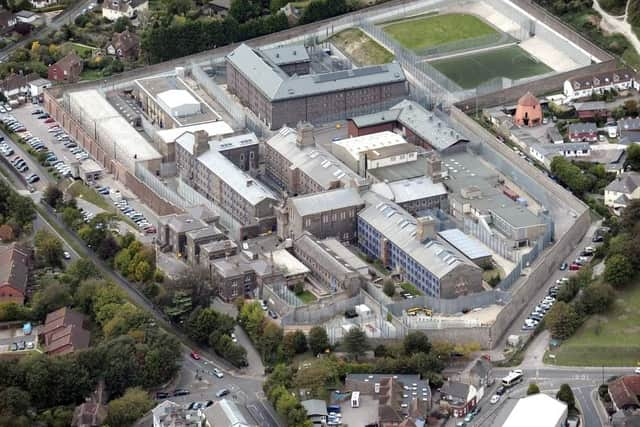Lewes prisoners spending 22 hours locked in cells as inspectors 'disappointed' by a lack of progress in safety for inmates
and live on Freeview channel 276
Inspectors to Lewes Prison were ‘disappointed’ by a lack of progress in safety, respect, and purposeful activity for prisoners since the lifting of pandemic restrictions.
A report, published today (August 23), by the HM Inspectorate of Prisons, stated the 520 men held in the East Sussex jail were spending long periods locked up in dirty conditions – with very limited access to work, education, or activity.
Advertisement
Hide AdAdvertisement
Hide AdCharlie Taylor, chief inspector of prisons, said: “This was a disappointing inspection of a prison that had made some good progress at our 2019 independent review of progress (IRP).


"There is no doubt that pandemic restrictions have hampered the ambitious governor in her work to improve the jail, but nevertheless the recovery was too slow.”
The report claimed around half of the prison population was unemployed, and there were no plans to increase their time out of cell.
It also said that there was not enough activity spaces and an inefficient allocations process made it difficult for prisoners to get into work or education.
Advertisement
Hide AdAdvertisement
Hide AdAccording to the report, there was little focus on improving the quality of education and not enough prisoners were successfully completing accredited qualifications.
Ofsted rated the overall effectiveness of education, skills, and work in the prison as inadequate.
Andrew Neilson, director of Campaigns at the Howard League for Penal Reform, said: “Some of the issues highlighted in this report are found in ageing local prisons around the country.
"Even when these prisons are not overcrowded, as is the case with Lewes, they face a wide range of problems in maintaining and running buildings that are no longer fit for purpose.
Advertisement
Hide AdAdvertisement
Hide Ad“People in prison are suffering due to a lack of adequate staffing, work and education provision, and adequately equipped or hygienic environments.
"Rather than continuing with plans to expand prison capacity in coming years, the government must focus resources on managing demand for prison places and in improving outcomes in the existing prison estate, which is in dire need of intervention.”
Vulnerable prisoners at Lewes were not sufficiently cared for, the report said.
Paperwork for those at risk of suicide and self-harm was often incomplete or inadequate and violence was still too high.
Advertisement
Hide AdAdvertisement
Hide AdThe report highlighted that leaders at Lewes HMP had not developed an effective strategy for analysing and understanding the causes of violent incidents.
It emphasised the complex issues faced by the prison – including ineffective partnerships between health care and the prison, significant difficulty in recruiting and retaining staff, and the inherent issues borne of running a prison housed in old, inadequate buildings that are challenging to maintain.
HAVE YOU READ THIS?
Mr Taylor said: “Lewes is a difficult prison to staff and run with old buildings that are expensive to maintain, but there needs to be a greater focus on getting some of the basics right.
"There is the opportunity to build momentum with what could be an effective leadership team to get this prison back on track and make it a better place for prisoners to stay and staff to work.”